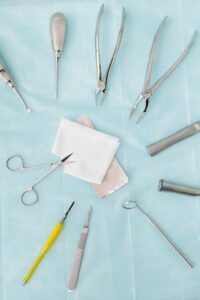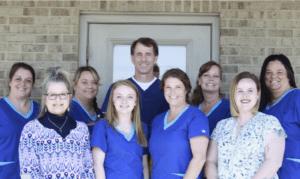No one looks forward to oral surgery, or any surgery for that matter. But as far as surgeries go, the vast majority of surgical procedures for oral issues are pretty minor. From wisdom tooth extractions to full mouth reconstructions, many oral surgeries are outpatient procedures, meaning you leave the same day.
There are multiple types of sedation for oral surgery that your surgeon might use, depending on the extent of the procedure. Anesthesia is a main worry of a lot of patients who need to be put under for their dental surgery. And other factors affect your surgery, as well as the recovery process, like your personal health and lifestyle choices.
Anytime you’re dealing with a procedure that requires medical sedation, there are certain things your oral or maxillofacial surgeon will tell you to do to prepare. But why aren’t you supposed to eat beforehand? And why does whether or not you smoke matter?
Here’s our guide to prepping for your oral surgery, and all the whys and hows behind it:
Recommendations and Explanations About Prepping for Your Oral Surgery
- Why you shouldn’t eat beforehand:
- If you’re being put under general anesthesia, your oral surgeon will probably ask you not to eat or drink for 12+ hours before your procedure. When you’re under general anesthesia, all the muscles in your body relax. So if you have food or liquid in your stomach, there’s a chance you could vomit or even aspirate the food or liquid. It could cause potentially life-threatening consequences.
- If you’re getting localized anesthesia, oral sedation or Novocain, your surgeon will likely strongly recommend abstaining from food or anything but water for 6+ hours before your oral surgery. This is because sometimes people become nauseous, either from anxiety or the medication. Also, food debris in your mouth could compromise the sterility of the environment of the surgery and leave you vulnerable to infection.
- Why attending your pre-op consultation is important:
- Knowing exactly what to expect from the procedure and getting comfortable with your oral surgeon can help your anxiety around the procedure and even your perception of pain after.
- Understanding what you should do to prepare for the surgery will set you up for a smooth recovery.
- Being able to ask any lingering questions you might not have asked at your previous appointment lets you rest assured you’re going in fully-informed.
- Why you should arrange post-op transportation beforehand:
- You need someone else to drive you home, no matter the type of procedure, so you should ask them in advance so they can adjust their schedule.
- Why it’s important to wear the right clothes:
- Loose, soft, comfortable clothing is ideal for your comfort before and after surgery.
- If you’re getting IV anesthesia, wear short sleeves so your oral surgeon has easy access to your forearms.
- Why we recommend getting your post-op medications before your oral surgery:
- You’re not going to want to go to the pharmacy after your surgery.
- If you’re in pain immediately upon leaving our office, you don’t want to have to wait to get your medication.
- Some pharmacies require the actual person the medication was prescribed to pick it up; you can’t rely on the idea that someone may be able to go get it on your behalf.
Habits That Can Affect Healing From Oral Surgery
This is where the “No Smoking” sign starts flashing. If you smoke, your oral surgeon will tell you to stop completely at least a week before surgery. On the short term, their concern is dry socket. But on the long term, smoking tobacco hurts your body’s ability to heal. Healing is slower, and there’s an increased risk of tissue necrosis at any suture or extraction sites. The mouth is one of the fastest-healing parts of the body, but it’s also the most susceptible to that nicotine habit. Make your surgery safer and your recovery faster (and just improve your health in general) by quitting smoking as soon as you know you’re getting oral surgery.
Other important habits that will affect your recovery process:
- Prep your house for when you get home from the procedure. Have a whole couch or bed situation prepped with easy access to gauze, water, tissues, your pain meds and your phone.
- Pay attention to your body. Oral surgeries differ a lot in recovery time. But one thing is for sure: if you have excessive pain despite taking meds, swelling after 2-3 days, and/or excessive bleeding, it’s not normal – call your oral surgeon’s office.
- Eat soft foods or only liquids for the few days after your oral surgery. It lessens pain as well as the risk of opening up the site by biting down wrong on something hard.
- Drink water. Hydration is important for all your body’s processes, and regularly drinking water will also help gently clean your mouth out throughout the day to prevent infection.
Prep for Your Surgery by Prepping for Your Recovery with Holistic Oral Care
A new product we’ve had great success with at our practice is the StellaLife VEGA Oral Care Recovery Kit. This kit is a 3-step rinse, spray and gel that utilizes clinically-backed homeopathic ingredients to reduce pain and inflammation and speed healing. For this reason, you’ve got to set your mouth up for success before you have the procedure done.
The recovery kit is a 10-day, 3x/day program that you begin 3 days before your surgery. By prepping your mouth with clean, natural treatments, you can help minimize chance of procedure-related complications. Ask us about the VEGA Recovery Kit at your pre-op consultation.
Talk to Your Cincinnati Oral Surgeon
We’re always available to our patients, before, during and after your oral surgery for any questions or concerns you have. Oral surgery is what we do, so our staff and our oral surgeon are experts not only at the procedure, but also at helping patients have the most comfortable experience possible. You’ll be told exactly what to expect and what not to expect at your examination and consultation, but if you’re worried and just need a calming influence from someone who can quell your concerns, give us a call. You don’t have to be worried; you’re in good hands.









